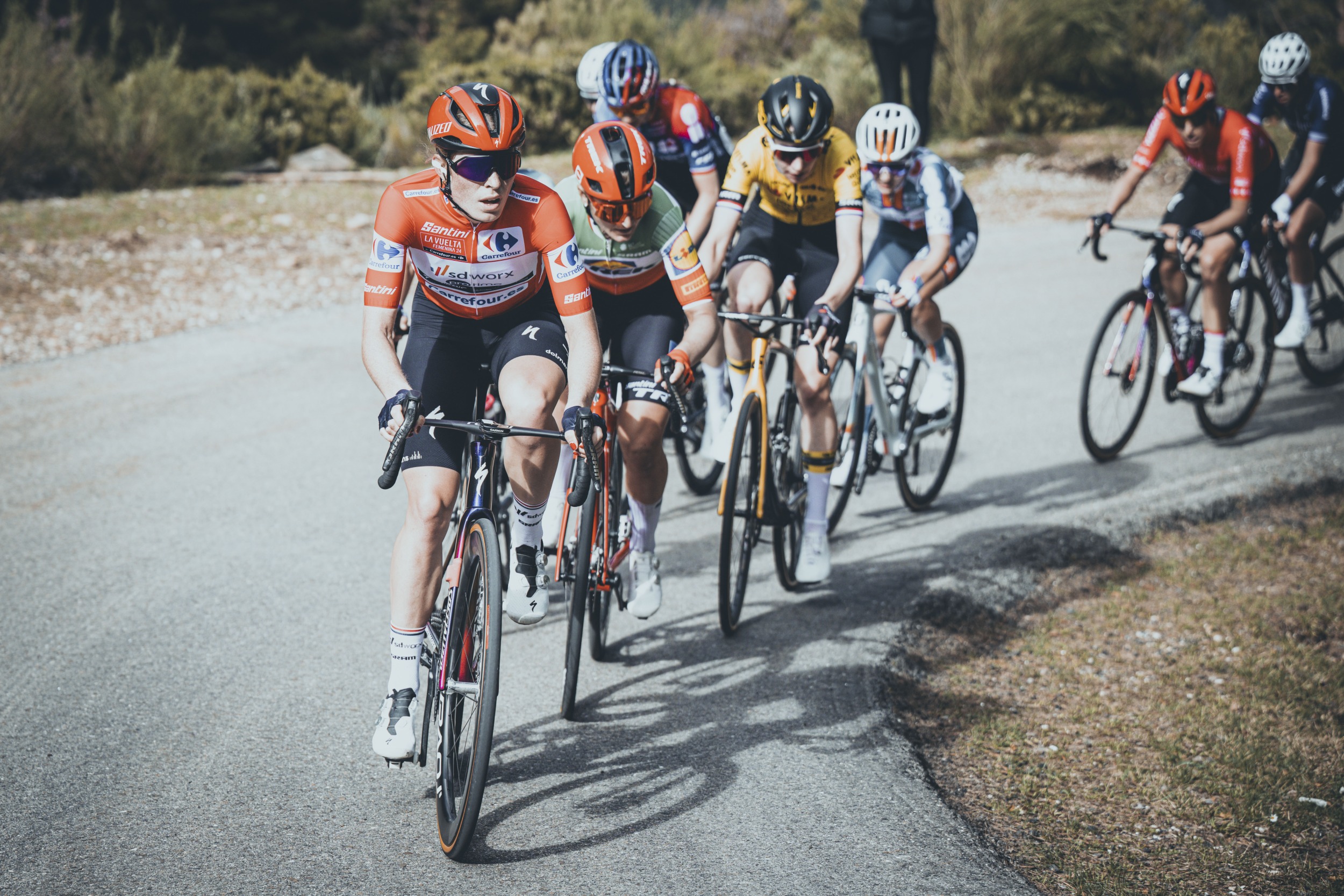

Reading the headlines this Spring Classics season, you could be forgiven for thinking Demi Vollering’s time in the Women’s WorldTour spotlight might already be waning. Although it’s nearly impossible to top (or even equal) winning the Ardennes triple, nearly every cycling media outlet questioned Vollering’s form during her spring campaign, sometimes in dramatic (and crude) effect. What those questions obscured, however, is a record that virtually every rider in the peloton would salivate over: podium places in Strade Bianche, De Brabantse Pijl, Flèche Wallonne, and Liège-Bastogne-Liège.
The media’s paradoxical hounding of Vollering makes more sense when viewed against the historical backdrop of women’s cycling. For decades, the results sheet was dominated by a handful of names and select teams: Vos, Ferrand-Prevot, Van der Breggen and Van Vleuten (all of whom rode for the storied Rabobank team at some point or other). These riders could win a Spring Classic, a stage race and a world championship (and in the case of Vos and Ferrand-Prevot, multiple cyclocross and mountain bike world championships between them as well!). But now, although she isn’t competing in 2004, the media foisted those outdated expectations right onto Vollering’s shoulders. Why shouldn’t the 2023 Tour de France Femmes avec Zwift winner come in, guns blazing, and take the Spring Classic spoils again in 2024? Or, at the very least, a victory or two?
Vollering burst into our collective notice by taking third in La Course in 2020 behind Lizzie Deignan and Marianne Vos while riding for the development team Parkhotel Valkenburg. The following year she took the victory in dramatic fashion in SD Worx colors after being led out for an eternity by Anna Van der Breggen, outsprinting the GOAT Marianne Vos. After such a victory, a betting wo/man could have put money on Vollering’s ability to nail down victories in a reduced bunch in Spring Classics and they would be spot on: she took the Ardennes triple the following spring. But then the 2024 pendulum swung from Ardennes triple to shut out. The media has been quick to diagnose lagging form (and perhaps strife within SD Worx – Protime) as the main culprit. But there is a more likely cause: the Tour de France Femmes.
Historically, women cyclists were all-rounders by necessity. Women’s teams had smaller rosters, and riders were expected to attend most races – be it a Spring Classic, a flat sprinter’s dream, or the more climbing-heavy Trofeo Alfredo Binda. Moreover, the women’s Giro d’Italia was the only race approximating a Grand Tour on the calendar for decades, and even then the stages were shorter and the climbs were manageable. That’s why we saw riders like Marianne Vos winning almost everything under the sun.
With the rise of the women’s peloton, however, so, too, have the women specialized in their training and in their physiology. And the Tour de France Femmes has encouraged and enabled that specialization. The Tour has given the women’s peloton unprecedented media exposure and that exposure has created new incentives to perform on epic and mythical climbs traditionally reserved for the men – climbs like the Col du Tourmalet and L’Alpe d’Huez. The Tour has also featured an individual time trial that has helped move the discipline from relative obscurity to must-have skill. The professionalism of the Tour de France Femmes also came with a perhaps unexpected and collateral benefit: it has caused the women’s Giro d’Italia and the Vuelta d’Espana to raise their game significantly. Indeed, since the first Tour de France Femmes in 2023, the Vuelta has grown from a one-day event in 2022 to an 8-day stage race in 2024!
All of these factors have combined to create a new, specialized career path for women professional cyclists: the GC rider. And Demi Vollering is a trailblazer on this path. (Arguably, Annemiek Van Vleuten was the original pioneer, but this would be an entire topic on its own.) Those who doubted Vollering’s form or her character this spring were finally shown Demi’s plans at La Vuelta Feminina (and the Spanish campaign in general), where she tore the peloton to shreds with a smile on the climbs. But training for and focusing on those sustained efforts day on day and the ability to rip the peloton apart on epic climbs comes with trade-offs. Yes, perhaps Vollering has traded some of that punch she was known for early in her career. She wouldn’t be the only one. Talk has also surrounded whether Lotte Kopecky has sacrificed some of her top-end speed by focusing on her climbing abilities.
But at least for Vollering, it appears it was all a sacrifice well worth making: she appears to be on track to take all three Grand Tours if she decides to race them. Because if and when she pulls on that last yellow jersey at the Tour de France Femmes this year, she won’t be thinking about that podium place at Flèche or those doubters from the Spring Classics. She’ll just smile knowing this was her plan all along.